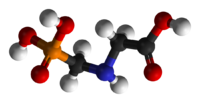
Photo from wikipedia
Conyza bonariensis (L.) Cronquist is one of the main glyphosate-resistant weeds in no-till fields in Brazil. Here, the seed quality of glyphosate-resistant (R) and -susceptible (S) C. bonariensis biotypes, collected… Click to show full abstract
Conyza bonariensis (L.) Cronquist is one of the main glyphosate-resistant weeds in no-till fields in Brazil. Here, the seed quality of glyphosate-resistant (R) and -susceptible (S) C. bonariensis biotypes, collected from different sites, was evaluated under stressful conditions by different seed tests. Glyphosate resistance was confirmed by dose-response and shikimate accumulation assays. The resistance factors were 6.9 (R1/S1), 4.5 (R2/S2), and 5.8 (R3/S3). Biotypes S1, S2, and S3 accumulated 2.7, 2.4, and 2.8 times more shikimic acid than biotypes R1, R2, and R3, respectively. Stress-free seed viability and germination potential ranged from 39% to 57% and from 37% to 57%, respectively, with no difference between R and S biotypes within each collection site. Seed incubation at 8 °C over 7 days (cold test) promoted greater germination in S biotypes (54% to 79%) compared to R ones (28% to 39%). In the accelerated aging tests (incubation at 42 °C over 48 hours), the germination decreased in both S (11% to 27%) and R (6% to 16%) biotypes. In the high-temperature stress tests, there were no differences in germination within biotypes at 35 and 45 °C; however, at 60 °C, the germination of the S1, R1, S2, R2, S3, and R3 biotypes was reduced by approximately 51%, 54%, 63%, 59%, 40%, and 30%, respectively. Under non-stressful conditions, germination potential and seed viability were similar in R and S biotypes; however, under cold or heat stress conditions, R biotypes reduced their germination rates, revealing that glyphosate resistance causes a fitness penalty in C. bonariensis at the seed level. However, because seed viability was not determined after experiments, it cannot be stated that such reduction in germination was due to the death or only a dormant phase of the seeds.
Journal Title: Agronomy
Year Published: 2020
Link to full text (if available)
Share on Social Media: Sign Up to like & get
recommendations!